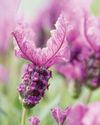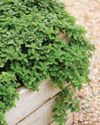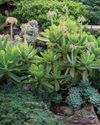Organisms in the soil influence these important performance factors.

The presence of micro- and macro-organisms (arthropods) in the soil contributes to its friability, which is the ease with which a large solid substance can be reduced to smaller pieces (such as crumbling between your fingers). As these organisms work their way through the soil, large clumps are broken down and fertilised with waste products. This not only adds to the fertility of the soil, but also enhances its drainage and water-retention properties. The organisms’ tunnelling also assists aeration and better water movement, both of which go to creating an improved environment for root growth.
The waste products released by soil organisms are rich in nutrients and work like tiny time capsules, releasing these nutrients back into the soil over a period of time. This gives the soil fertility and affects its pH and chemical composition. Soil with a fairly neutral pH and good levels of micro- and macro-organism is able to unlock valuable nutrients such as nitrogen, phosphate and magnesium. These are then made available to the plants more efficiently than in soil that has a higher acidity or alkalinity. In this type of soil, because there are less organisms present, the soil holds onto its nutrients. Of course, some plants are adapted to living in such conditions.
Functional benefits of arthropods in the soil
Microbial activity
As arthropods feed on fungi and bacteria they create a symbiotic relationship between the fungi and bacteria, and improve the decomposition of organic matter. The level of arthropods feeding on bacteria/fungi directly influences the stability of this symbiotic relationship.
هذه القصة مأخوذة من طبعة August 2018 من The Gardener.
ابدأ النسخة التجريبية المجانية من Magzter GOLD لمدة 7 أيام للوصول إلى آلاف القصص المتميزة المنسقة وأكثر من 9,000 مجلة وصحيفة.
بالفعل مشترك ? تسجيل الدخول
هذه القصة مأخوذة من طبعة August 2018 من The Gardener.
ابدأ النسخة التجريبية المجانية من Magzter GOLD لمدة 7 أيام للوصول إلى آلاف القصص المتميزة المنسقة وأكثر من 9,000 مجلة وصحيفة.
بالفعل مشترك? تسجيل الدخول

FIRE AND Feathers!
On a dreary winter's day, a screen of fiery and feathery leaves puts up a fight against dullness!

GET THE ladies in!
At this time of year, early-flowering shrubs vie with each other to get the most attention. We say: Trust those with female names for frills and butterflies. They go the extra mile to flower their hearts out.

Vegetable Soups and dumplings
Vegetables make the most delicious soups and classic combinations are always a winner.

Yummy sweet potatoes for your good health
Boiled, baked or braaied, sweet potatoes (Ipomoea batatas) are a delicious and healthy winter comfort food. Just a dollop of butter, a little seasoning and you are good to go.

Pretty and functional
If cooking is your main thing, you would probably be more interested in the culinary value of the three herbs and some of their varieties we are describing.

Dried Seedheads & Pods
Autumn and winter are the best times to see what flowers produce the best seedheads that can be left on the plants to feed the birds and bugs and for harvesting for dried arrangements.

SO MANY FACES and so many choices...
Whoever associated a Cotyledon orbiculata (pig's ear) with the ear of a pig obviously did not know about all the varieties and cultivars this species in the genus Cotyledon has.

COLOURFUL Cold Weather WINNERS!
If it comes to a vote, these dependable shrubs will be the top candidates for prime performance in winter and in other seasons...

What makes a garden sustainable?
It is interesting to note that the United Nations defines sustainable development as: “development that meets the needs of the present without compromising the ability of future generations to meet their own needs”.

Nurturing NATURE-The Story of Kraal Garden's Transformation
Nestled within Prince Albert's rustic embrace lies a gem that is a testament to the transformative power of human vision and nature's bounty.